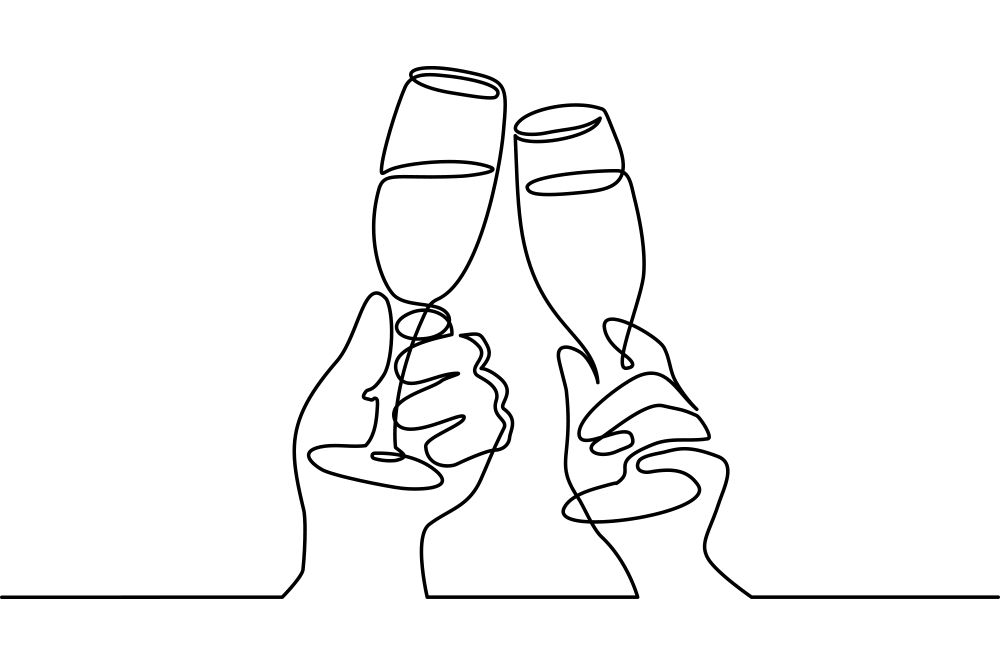
The brother of the groom grasped the wireless microphone and cleared his throat: “Well ... you’re probably all as surprised as I am to see me up here. My brother and I have hated each other most of our lives. So ... good luck, I guess.”
The mic dropped, and he exited the dance floor.
“I didn’t even give my normal ‘Let’s give him a round of applause,’” said the disc jockey emceeing the event. “I just hit the next song and hoped Lionel Richie could perform a much-needed exorcism.”
If you’ve been asked to give a toast or just a few words at a special occasion, the goal is to tell the emotional truth of your relationship with the person being honored. It’s meant to celebrate a milestone and look toward the future or look back fondly on the past. And unlike that brother of the groom toast, you don’t have to be brutal to be honest.
In this Toastmasters Podcast episode, learn extra tips for mastering your special occasion speech with Toastmaster Eddie Rice.
For many people, fear can get to them on the big day. Fear paralyzes; fear weakens; fear can eclipse our desire to perform at our best. Yet think of the moments when fear has been a positive motivator in your life. Have you ever put together a large presentation for work, knowing how much it mattered to your reputation? Think of your first time as a parent, and how much love and fear motivated you to do your best to care for a living being.
How can you channel that same love for the person you’re honoring, to create something wonderful instead of disastrous? Below you will find the necessary tools to create a memorable toast. Just remember the guidelines though the acronym “C.H.E.E.R.S.”
C = Concise
No one ever complained that a toast was “too short.” Keep yours to five minutes or under. To find the right word count, multiply 150 (the typical amount of words we speak per minute) by five, which comes to 750 words. You can calibrate that number higher or lower depending on your natural speaking rate.
Also, find out the order of speakers for the event. If you’re among the first, it might be okay to speak up to seven minutes. However, if you’re the last to speak, and the event is nearly over, keep it under five minutes.
H = Honor
The best toasts have two goals: honoring the person and honoring the event. You want to celebrate the person you’re toasting by telling great stories that compliment them. You want to also talk about the significance of the event in the lives of those attending.
Take the moment to shine a light on the person you’re
celebrating rather than stealing the limelight for yourself.
Include stories about the person you’re honoring, why you’re grateful they are in your life, and why this milestone—retirement, wedding, birthday, or other occasion—is also important in the lives of your listeners.
Take out lame introductory and inside jokes, or comments that would embarrass the honoree or attendees. Cut any thank-you list that’s so long it would make the Oscars awards start playing their send-off music.
E = Ego
There’s nothing wrong with wanting to perform your best and you should be motivated to do so with any speech, but you cross the line when you make it about you rather than the person or people you’re honoring. It’s not the moment to start your stand-up career, and no one is going to be celebrating the anniversary of your toast one year from now. Take the moment to shine a light on the person you’re celebrating rather than stealing the limelight for yourself.
E = Engaging Stories
In a toast under five minutes, you usually have time to tell one engaging story. Here are some ideas to help you plan which story you want to tell:
- They were there for me when …
- The funniest story I can remember about them is when …
- I learned the most about them when they …
- They showed their true character when …
- I can never forget the time when they …
R = Relatable
Keep the inside jokes to a minimum—if you have to explain a joke, it ceases to be funny. Instead, choose stories and anecdotes that the entire audience can enjoy. In addition, try to keep everything family-friendly. You don’t know the sensitivities of everyone in the audience. Leave the Vegas stories in Vegas.
S = Structure
Keep it simple:
- Introduce yourself and your relationship to the person you’re toasting.
- Talk about the significance of the person or event, whether it’s a retirement, wedding, milestone birthday, or the day of a memorial.
- Tell one great story about the honoree.
- Give advice, if appropriate. Tell how the honoree’s story can give us lessons on how to approach work, marriage, and/or life.
- End with “Raise your glass,” and a simple quotation. To make the toast unique, find something that the honoree loves from a favorite song, book, or movie.
Practice Your Toast
First, record yourself and listen to the audio. Or if you prefer, get a transcript of the recording (Toastmasters’ AI partner, Yoodli, provides transcription) and edit your speech.
Second, listen to others’ feedback, but don’t get oversaturated with too many opinions or lavish praise. Instead, look for the common threads among the feedback. If you’re a Toastmaster, your club may be willing to give you the stage to try out your toast. Your fellow club members can offer constructive criticism.
Third, if you can, practice where you are going to give the toast. See if you can get into the event space early and map out where the crowd is going to sit and where you are going to stand to give your toast.
Internalize, Rather Than Memorize
Know your speech so well that you can give it from a bulleted list on notecards. Notecards are better than using a cell phone, as your battery might die, and the backlight from the phone can cause problems for the photographer. Plus, you may have to squint to read the small text. If you use notecards, write on them with a Sharpie marker, as pencil or pen may be hard to see under dim lights.
One thing I tell the people I work with is to aim for 90% rather than 100%. Don’t get hung up on trying to be perfect or imitating what you saw in a movie. You don’t have Hollywood screenwriters or Saturday Night Live comedy writers crafting the perfect lines for you. Instead, speak from the heart and remember to honor the person or honor the event.
Eddie Rice is the author of Toast: Short Speeches, Big Impact, and a member of Eastside Toastmasters Club in Shaker Heights, Ohio. You can find out more about him at ricespeechwriting.com.
Related Articles

Presentation Skills
Tips for Toasting

Communication
Cheers to New Beginnings!

Speaking Outside The Club



 Previous
Previous

 Toast Research
Toast Research
 Previous Article
Previous Article